Safeguarding our future
food supply
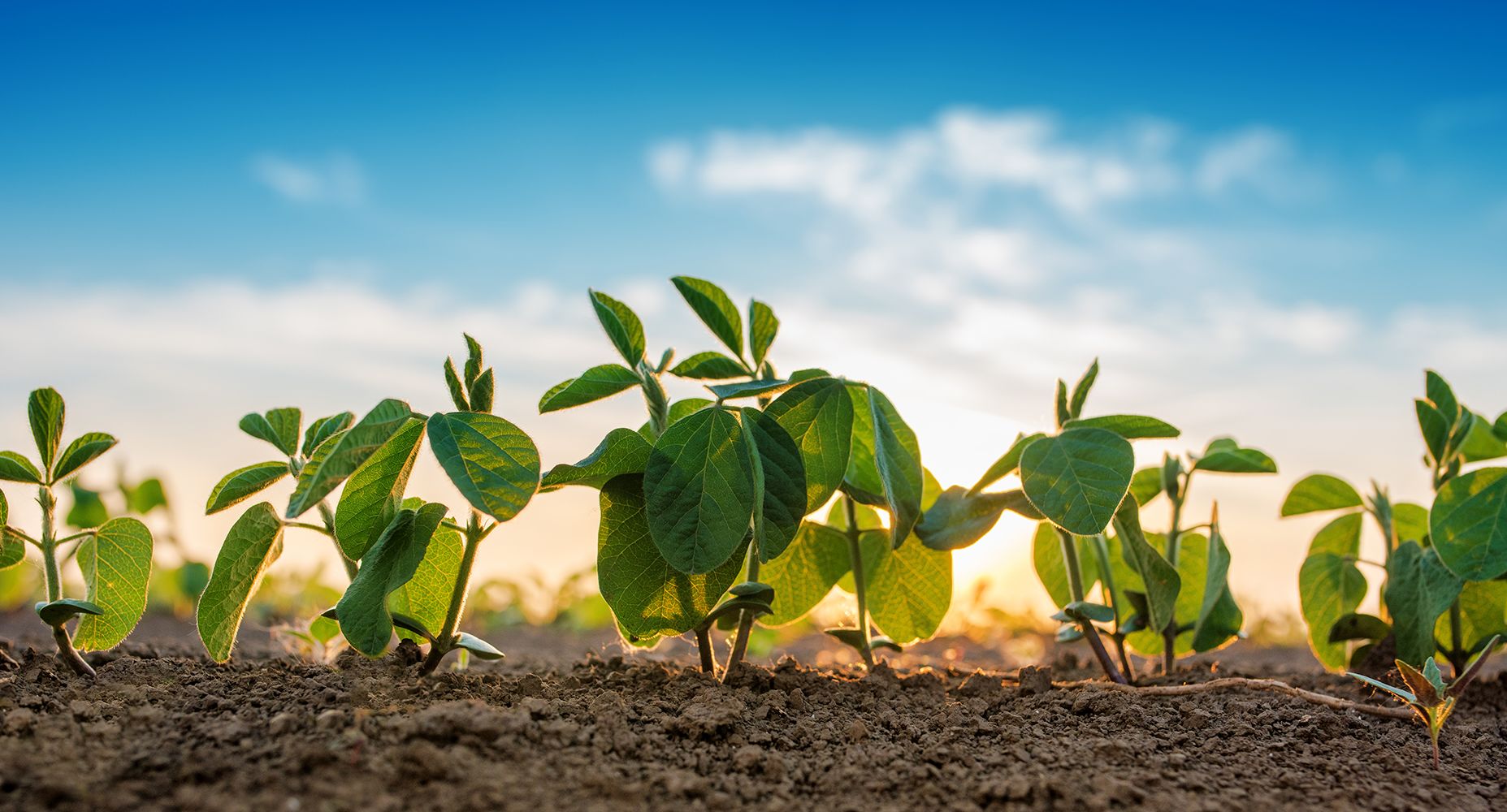
To celebrate Research Week 2018, UQ is proud to share how UQ research is creating change, right across the world, every day.
Find out how our researchers are collaborating with research partners both in Australia and abroad to protect our future food supply.

With most of Australia’s farmlands currently gripped by the worst drought in a century, and with scientists predicting agriculture will be one of the industries hardest hit by climate change, the issue of food security, and how the world will continue to grow enough food to feed its growing population in these changing conditions, has never been more important.
According to the United Nation’s Department of Economic and Social Affairs, the world’s population is expected to exceed nine billion by 2050, and food production will need to increase by 70 per cent in order to sustain the ever-growing number of humans on our planet.
However, research has shown that changes in our climate are already having a negative impact on crop yields on a global scale, and this is set to continue as global temperatures continue to rise.
On the flip side, the agriculture industry is one of the greatest contributors to greenhouse gas emissions, the main driver of global warming. So the challenge for scientists is to find new ways of producing food that cause less environmental harm, while also safeguarding the world’s future food supply through the development of more resilient crops.
In collaboration with global partners, UQ researchers are meeting this challenge and leading the way with discoveries and breakthrough technology that have the potential to bolster global food security.
Breeding better crops
UQ is helping farming communities around the world meet the growing demand for food production through a partnership with the Bill & Melinda Gates Foundation that is exploring ways to increase crop yields globally.
The Bill & Melinda Gates Foundation awarded UQ a US$2.7 million grant in 2015 to implement a Breeding Program Analysis Tool (BPAT) to assess breeding programs in developing countries.
BPAT is a structured review of technical, capacity and management components of plant breeding programs that aims to help create improvements that increase efficiency and achieve higher rates of genetic gains in crops.
Associate Professor Chris Lambrides from the School of Agriculture and Food Sciences and Professor David Jordan from the Queensland Alliance for Agriculture and Food Innovation are leading the project.
"We can help breeding programs create new cultivars that have higher yield, which will bring greater profitability to farmers and help alleviate poverty in the developing world,” Associate Professor Lambrides says.
Since starting BPAT, the team has visited breeding projects in Ethiopia and India.
Eventually the project will extend across 11 breeding programs in Sub-Saharan Africa and South Asia, covering plants including sorghum, rice, maize, wheat, chickpeas and bananas. The team has also developed the BPAT website, which acts as an information hub and provides tools that allow organisations to conduct self-assessments.
Pictured: Professor David Jordan in a sorghum field.
Read more about the BPAT project on UQ Research Impact.
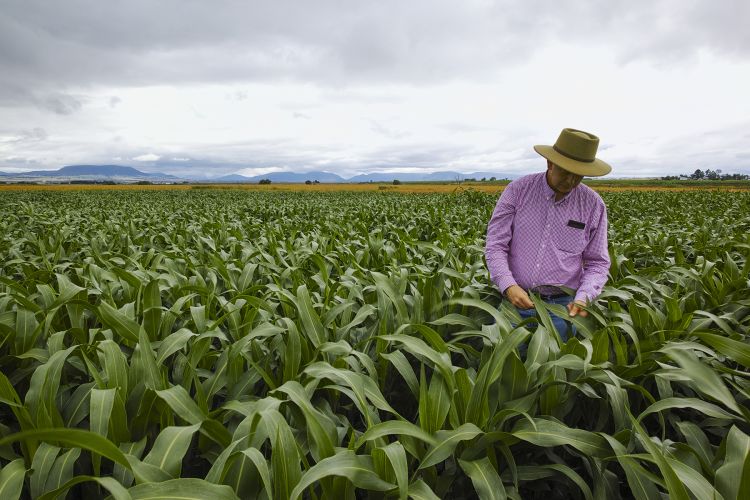
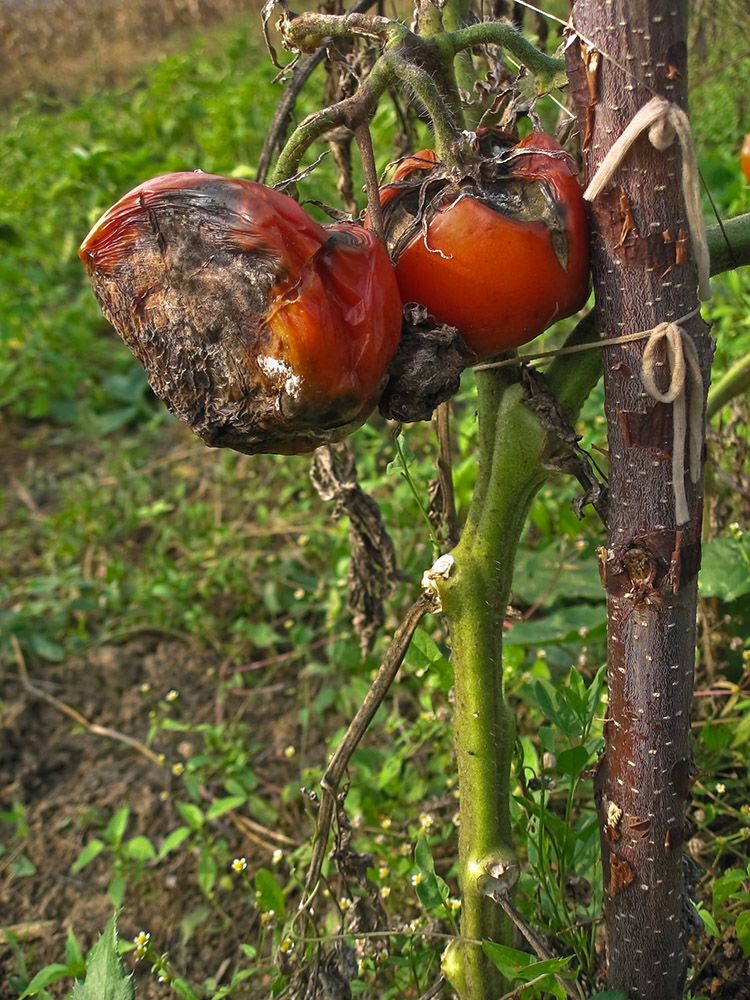
Commercialising crop technology
Farmers across the world could soon access disease-resistant crops using technology developed at UQ .
Nexgen Plants was launched by UQ’s commercialisation arm UniQuest in 2013 and has grown thanks to investment from the Queensland Government’s Business Development Fund (BDF), Uniseed and Yuuwa Capital.
The Brisbane start-up is commercialising two novel platform technologies developed from research led by Professor Peer Schenk at UQ’s School of Agriculture and Food Sciences.
The first is the company’s INTtraitTM intragenic breeding technology, which rapidly generates new plant varieties that are disease-resistant and have other important traits found in major food, fibre, energy and ornamental crops, essentially speeding up natural breeding.
The second is a virus-resistant technology that can quickly respond to emerging viral threats in key crops, including tomatoes, capsicums, potatoes and sorghum varieties, such as sugarcane.
UniQuest CEO Dr Dean Moss said the investment was a significant milestone and testament to the company’s potential future impact on worldwide crop production.
“Crop losses caused by disease or environmental conditions like drought are a significant global problem and cost billions of dollars every year,” he said.
“The research and technology being developed by this innovative Brisbane company has potential impact for farmers and producers right across the world.”
Read more about this exciting research development on UQ News.
Protecting plants with nanotech
UQ scientists have joined forces to develop a breakthrough that has the potential to bolster global food security.
Agricultural biotechnologist Professor Neena Mitter and her team at the Queensland Alliance for Agriculture and Food Innovation (QAAFI) have partnered with scientists from the Australian Institute for Bioengineering and Nanotechnology (AIBN) to develop BioClay, a nanotechnology innovation that could help reduce crop losses to pests and diseases, without toxic environmental impacts.
BioClay uses a mechanism known as RNA (ribonucleic acid) interference, or gene silencing, which has become a standard cause-and-effect approach to understanding plant biology.
In this case, gene silencing is delivered as a non-genetically modified, non-toxic spray by partnering it with clay nanoparticles, co-developed by (former UQ) Professor Max Lu and AIBN Professor Zhi Ping (Gordon) Xu.
“Double-stranded RNA (dsRNA) is the trigger molecule for gene silencing – we just take that sequence from the pathogen, load that sequence on the clay molecule, and then we have this wonderful spray that we can use to protect crops,” Professor Mitter says.
“BioClay uses the sequence from the virus itself. It acts like a vaccination, whereby the dsRNA is slowly released onto the surface of the leaf, it enters into the plant, and the plant is primed for defence. The clay particle acts as a controlled-release mechanism and is completely degradable.”
Professor Xu’s contribution was to develop a nanoscale clay matrix that is ideally suited to protect dsRNA once it is sprayed onto a crop.
“We were able to provide a delivery vehicle that is loaded onto the plant and can last on the leaf’s surface for 30 to 40 days, providing an elongated window of protection,” Professor Xu says.
UQ's main commercialisation company UniQuest is now helping drive the commercialisation of BioClay through a partnership with Nufarm Ltd, a worldwide manufacturer of crop protection products.
Pictured: Professor Neena Mitter and her team at UQ Gatton.
Read more about BioClay's potential global impact on UQ Research Impact.
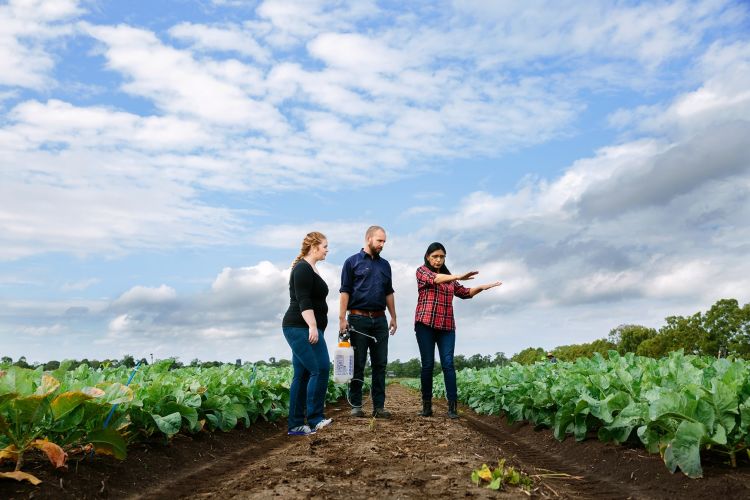
Digging deep for a sustainable solution
As land continues to be cropped, soil nutrients decline over time because they are removed in the food that is produced. Fertilisers help to offset this by keeping soils productive and healthy, but if the correct product and strategies aren’t applied – including rate, placement and timing – then the use of fertilisers actually has no effect.
Professor Michael Bell from UQ's School of Agriculture and Food Sciences is working to address this by developing effective fertiliser replacement strategies to overcome the fertility decline in northeast Australia’s grain-growing soils.
With support from Grains Research and Development Corporation and in collaboration with New South Wales and Queensland government agencies, this research is improving the profitability and sustainability of broad-acre cropping by improving the way farmers and businesses apply and manage phosphorus, a key nutrient found in soil.
The project has demonstrated how the periodic placement of P fertiliser bands in the middle of these depleted profile layers can best influence crop yield and nutrition, with increased crop yields of between 10 and 30 per cent in more than 30 field sites from Central NSW to Central Queensland.
“We are offering grain growers a way of ensuring that expensive P fertiliser investments are only applied when needed, but placed in a way that maximises crop recovery and productivity gains” Professor Bell says.
With declining soil phosphorus reserves (especially in the subsoil) a major limitation to crop yields, appropriate fertiliser management strategies are critical to improving profitability.
In the longer term, maintaining soil fertility will also give landowners the flexibility to diversify their crops in response to market signals.
Find out more about how UQ researchers are working to improve the profitability and sustainability of crops both nationally and globally.
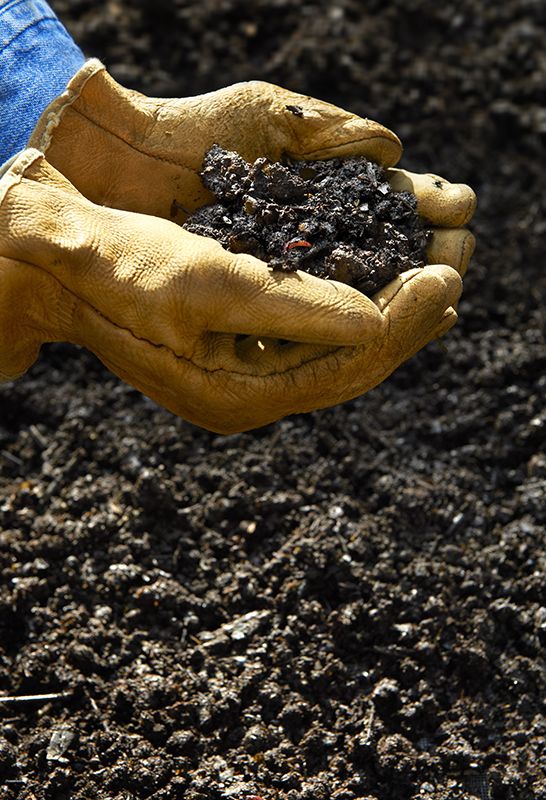
Saving Australia’s favourite fruit
Australian bananas are the number one selling fruit in the country, yet the entire industry is at risk of being derailed due to disease sweeping parts of the globe, decimating banana plantations and hurting livelihoods.
UQ researchers have joined the fight to save banana crops across the globe from the disease known as Panama Tropical Race 4 (TR4) – a strain of the Fusarium wilt fungus.
The fungus has already spread through Asia and was recently found in Africa and the Middle East. In 2015, it was found in north Queensland, where over 90 per cent of Australia's bananas are produced. The popular Cavendish variety, which is the world's largest banana crop, is highly susceptible.
Professor Elizabeth Aitken from UQ’s School of Agriculture and Food Sciences is looking at ways to protect the banana industry.
Professor Aitken says researchers are working on developing more specific diagnostic tools, as well as looking at wild banana lines that show resistance to TR4.
UQ’s Queensland Alliance of Agriculture and Food Innovation (QAAFI) is also tackling the problem with the help of a $2.4 million investment from Horticulture Innovation Australia.
QAAFI’s Professor Andre Drenth explains that “the overall outcome of this project will deliver what is an ongoing world-leading ability to detect, identify and manage a wide range of exotic and emerging diseases, protecting Australia’s enviable banana production environment.”
UQ researchers have also partnered with the International Institute of Tropical Agriculture on a program to protect bananas in Africa's Great Lakes region, with the program receiving funding from the Bill & Melinda Gates Foundation.
Read more about how UQ researchers are working to protect Queensland's banana industry.
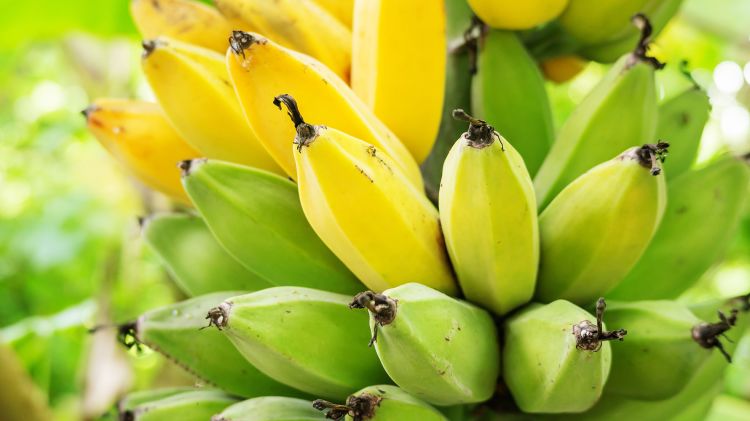
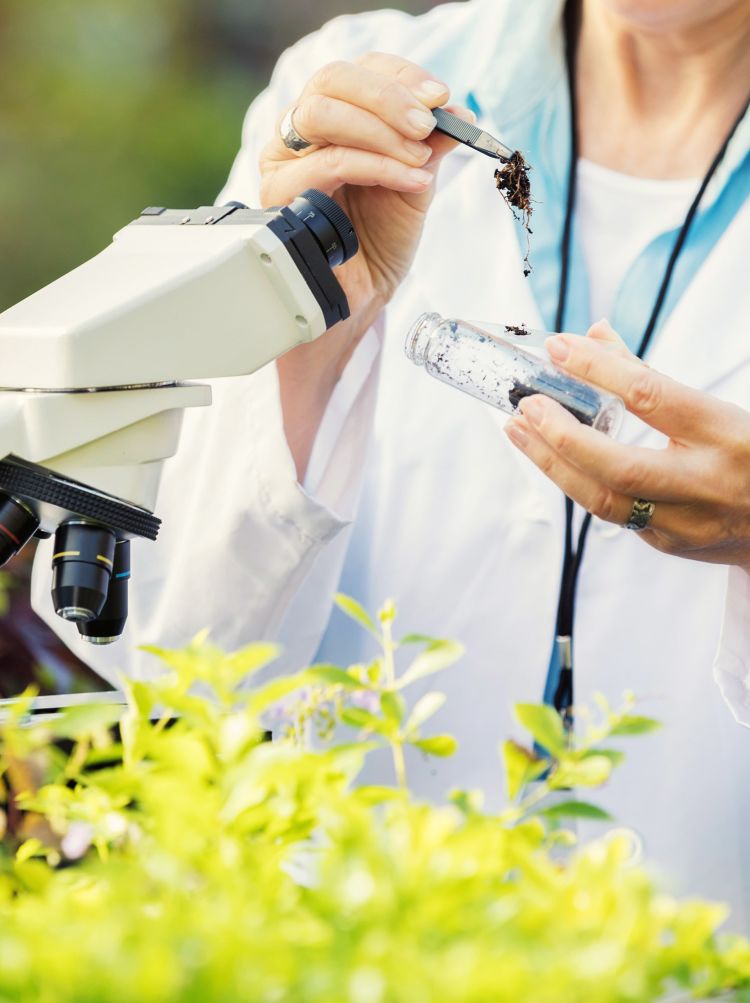
Weeding out unhealthy crops
UQ researchers are calling for better regulation in the Australian crop probiotics industry to boost farmers’ confidence and safeguard our future food supply through healthier crops.
Professor Susanne Schmidt and her team at UQ’s School of Agriculture and Food Sciences are experimenting with sugarcane and vegetable crops, and have found that lax regulations around product testing, labelling and marketing in Australia are limiting the benefits of crop probiotics.
The team is partnering with leading industry bodies, including one of Australia’s largest horticulture nurseries, Wide Bay Seedlings, which wants to use fewer harmful chemicals on its crops and deliver more resilient seedlings to customers.
They are also collaborating with a small company (SOSBIO) that has just been awarded a $1.8 million cooperative research centre project which, together with the company’s $900,000 investment, will advance research on beneficial microbes and organic fertilisers derived from wastes.
The team has tested commercial probiotics as well as microbes that naturally occur in Australian soils to evaluate if they have plant-growth promoting effects.
“Using DNA-technology, we can track microbes from the commercial probiotic product, to the soil and the crop, and determine if the probiotics change the microbial communities to boost more beneficial bacteria or fungi,” Professor Schmidt says.
“We then quantify if there are direct crop benefits – faster growth, increased resilience, or improved yield.”
During testing, the team discovered that commercial products and microbes taken from Australian soils varied in their effect on crops exposed to different conditions, meaning more investigation is required to prove their usefulness for farmers.
“Many crop probiotics do not deliver the promised benefits, potentially depriving our farmers of genuine products developed and tested with scientific methods," Professor Schmidt says.
“We hope this research will help drive policy change in Australia to adopt the European Union model, which is more regulated and standardised, within the next three to five years.”
Read more about Professor Schmidt's research on UQ Research Impact.
Protecting the intellectual property of agricultural production
The Asian Development Bank estimates 537 million people remain undernourished in the Asia-Pacific, and the region’s seven per cent annual growth rate is putting even more pressure on food sources.
UQ Law Professor Brad Sherman is examining how intellectual property can be used to boost food security, and his findings could go a long way towards feeding millions of starving people around the world.
“The aim is to maximise the benefits and minimise the costs of using intellectual property protection to improve agricultural productivity and food security in Australia and the Asia-Pacific,” Professor Sherman says.
Little research has been done in the field, despite the importance of intellectual property to agricultural production.
“Great advances are being made in agricultural production, but how to secure that knowledge to benefit society isn’t widely known and that’s what I am hoping to achieve.”
Professor Sherman’s research is funded by a $2.76 million Australian Research Council (ARC) Laureate Fellowship.
Read more about Professor Sherman's ARC Laureate Project Harnessing Intellectual Property to Build Food Security.
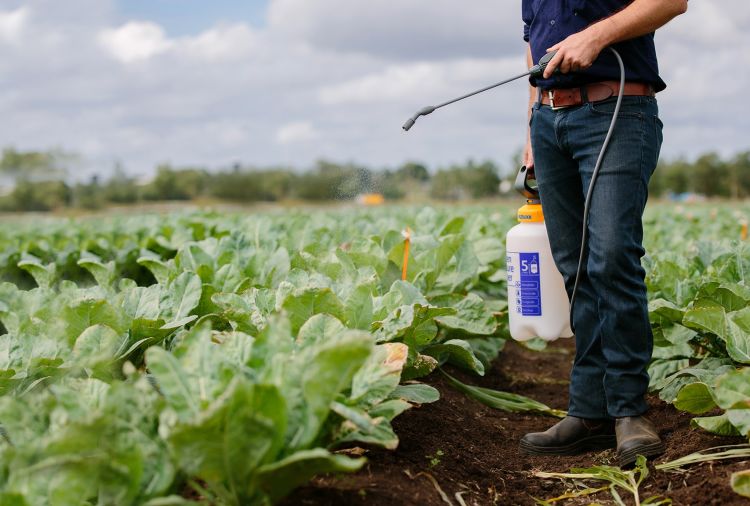
Multiplying the ‘tree of life’
The coconut is widely known as the ‘tree of life’ due to its pivotal role in providing food and drink, as well as household and industrial products.
However, coconut farmers in South-East Asia and the South Pacific are facing serious production challenges, such as low prices, soil nutrient run-down, storm and cyclone disasters, and widespread outbreaks of lethal diseases.
Uncertainty about the potential of seedlings for replanting old and fragmented groves also remains an issue.
UQ scientists are now working to meet those challenges through the development of affordable plant tissue-culture technology, aimed at enabling rapid multiplication of plantation coconuts.
Professor Steve Adkins, Mike Foale and Quang Nguyen from UQ’s School of Agriculture and Food Sciences have developed an improved method for embryo culture that allows safe local and international movement of germplasm, and successful cryopreservation and regeneration of the embryo.
Further research is currently underway to mass-produce elite clones with a more rapid and efficient technique through somatic embryogenesis.
The UQ team has collaborated internationally with organisations such as the Philippine Coconut Authority, Institute of Oil and Oil Plants in Vietnam, Indonesian Coconut and Other Palms Research Institute, Coconut Research Institute in Sri Lanka, Australian Centre for International Agricultural Research, Asia-Pacific Coconut Community, Cocoa and Coconut Research Institute of Papua New Guinea, and Kokonas Indastri Koporesen PNG.
Read more about how UQ agriculture and food science researchers are developing innovations to create a more sustainable world.
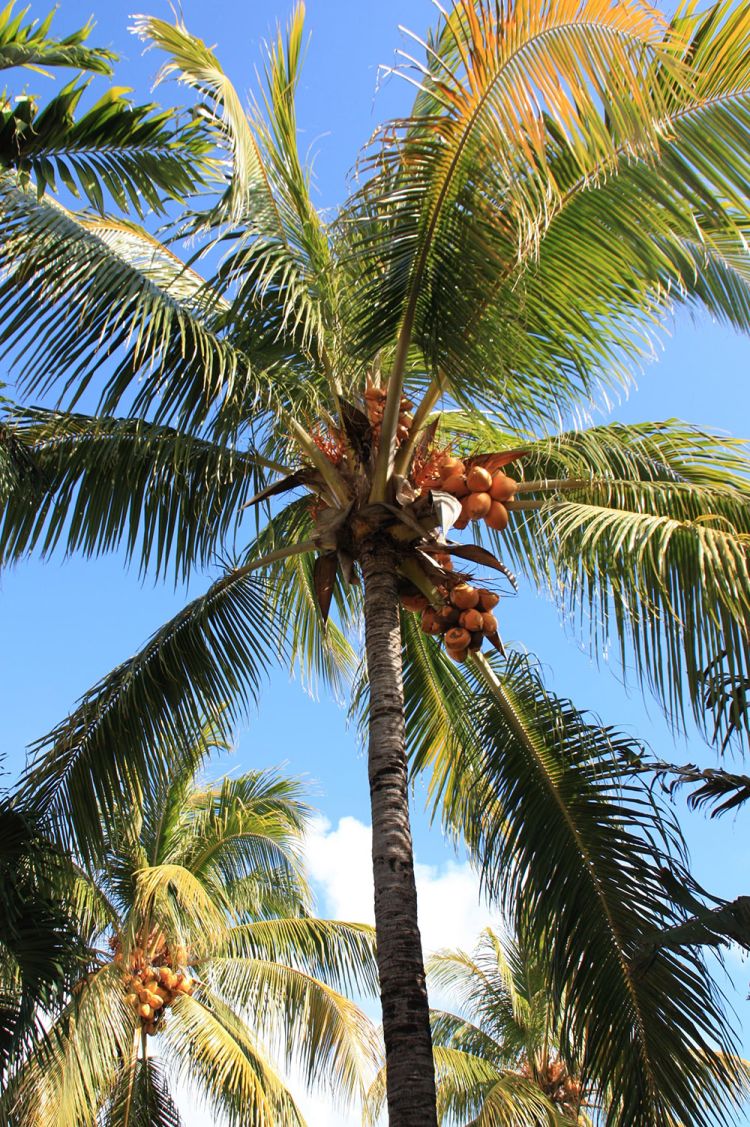
Improving sorghum yields for feedgrain and foodstuff
Sorghum is worth $600 million per annum to Australia and is vital as feedgrain to the nation's cattle, pork and poultry industries. It's also a staple food for 500 million people worldwide, including in countries such as India and Ethiopia.
Of the 25 sorghum species that exist globally, 17 are native to Australia.
The rate of productivity gain for sorghum in Australia is greater than reported by any other developed nation. UQ plays a significant part in that growth via a sorghum pre-breeding public research program, led by Professor David Jordan from the Queensland Alliance for Agriculture and Food Innovation (QAAFI) in collaboration with the Department of Agriculture and Fisheries and the Grains Research and Development Corporation.
According to QAAFI’s Professor Graeme Hammer, the program draws upon a range of scientific disciplines including genetics, plant physiology, crop modelling, molecular biology, pathology and entomology, and focuses on sorghum genetic improvement.
“Our development of elite sorghum lines for licensing to the global sorghum hybrid seed industry has generated positive impacts both economically and environmentally," Professor Hammer says.
In fact, the program has seen cumulative net benefits of more than $220 million for Australia since 1997, averaging out to around $20 million per year.
"By developing stronger breeds, sorghum yields have increased and production costs have decreased due to improved insect resistance and the reduced need for chemicals, along with improved drought adaptation," Professor Hammer explains.
“Some producers have reported the percentage of midge-affected plants dropping from 40 per cent to less than five per cent thanks to more robust plant genetics; and all have enjoyed the increased efficiency and use of available water, with more flexibility to sow at different times of the year.”
To date, the program has licensed nearly 3000 sorghum lines to the sorghum producing industry since 1989 – around 10 times the amount of plant breeding material than all the other public sorghum breeding programs around the world combined.
And Professor Hammer says there are still more opportunities to be explored.
'The program will continue to pursue benefits for growers and industry through high-impact science, targeting greater yields and advances in product quality."
Read more about the impact of QAAFI's extensive sorghum research.
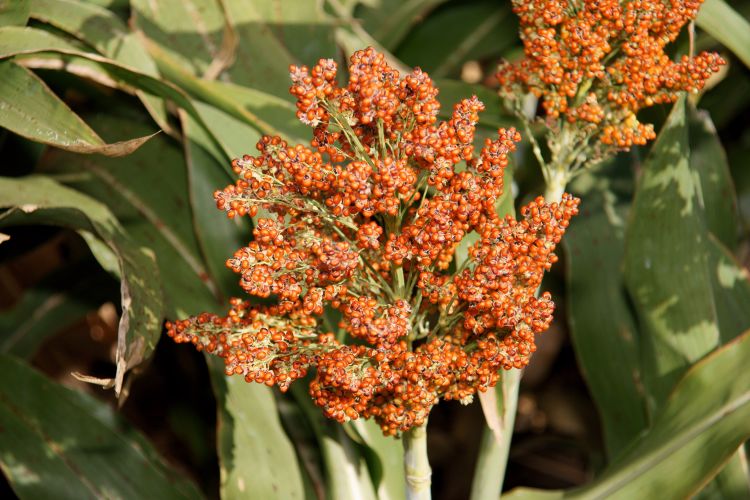
Discover how we create change
From science and sustainability to health and humanities, UQ research has impact.




